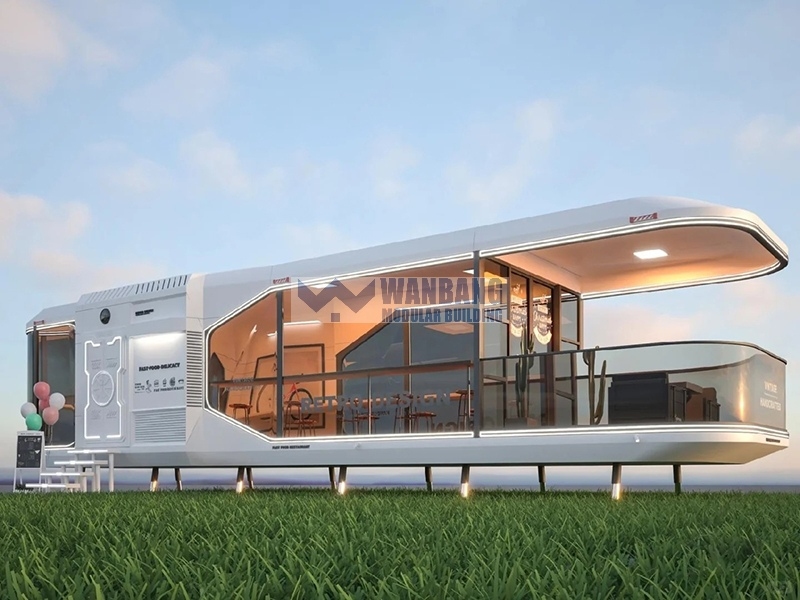Quanto tempo duram as casas cápsula?
Mar 26, 2025
1. Panorama atual da indústria de casas cápsulaO casa minúscula cápsula O setor está em expansão global, impulsionado pela crescente demanda por moradias sustentáveis, com economia de espaço e custo-benefício. As principais tendências incluem:Soluções de casas cápsula pré-fabricadas dominam mercados na Ásia e na Europa devido à rápida urbanização.Inovações no design moderno de casas modulares, como a Casa cápsula de maçã (modelos integrados à tecnologia) e Casa cápsula estelar (unidades focadas em luxo).Crescente popularidade de projetos de casas cápsula ecológicas, enfatizando energia solar, materiais reciclados e sistemas de eficiência energética.As principais marcas de fabricantes de casas pré-fabricadas estão se expandindo para o mercado de casas cápsula, oferecendo opções personalizáveis como casa cápsula 2 quartos layouts. 2. Vida útil das casas cápsulaUma casa cápsula bem construída normalmente dura 30–50 anos, com alguns modelos de casas cápsula do tempo excedendo essa faixa. Os fatores que influenciam a longevidade incluem:Qualidade do material: Ligas de nível aeroespacial, fibra de carbono e revestimentos à prova de ferrugem.Manutenção: Manutenção regular dos sistemas (por exemplo, vedação, HVAC).Ambiente: Climas severos podem exigir substituições de componentes mais frequentes. 3. Por que as casas cápsula duram tantoOs principais recursos de durabilidade incluem:Materiais avançados: estruturas de titânio, painéis resistentes ao calor e polímeros autorreparadores.Modularidade: Seções danificadas (por exemplo, encanamento, isolamento) podem ser substituídas sem desmontar toda a estrutura.Monitoramento Inteligente: Sensores de IoT detectam vazamentos, corrosão ou rachaduras por tensão precocemente.Redundância: Sistemas críticos (energia, água) têm backups para evitar falhas.Por exemplo, casa cápsula de luxo os modelos usam revestimentos de nível militar para resistir a condições climáticas extremas. 4. Vantagens das Casas CápsulaEcológico: Projetos de casas cápsula ecológicas reduzem a pegada de carbono por meio de painéis solares e coleta de água da chuva.Acessibilidade: Modelos pré-fabricados (por exemplo, minicasas cápsula) custam de 20% a 50% menos do que casas tradicionais. Os preços variam: Quanto custam as casas cápsula? Normalmente 20k–150k, dependendo do tamanho e dos recursos.Personalização: As opções variam de unidades minimalistas de casas cápsula com 2 quartos até designs de casas cápsula da Apple repletos de tecnologia.Mobilidade: Algumas unidades são transportáveis, ideais para moradia temporária ou remota.Avaliações Positivas:A maioria dos comentários sobre casas cápsula destaca economia de energia e apelo minimalista. 5. Requisitos legais para morar em casas cápsulaOs regulamentos variam de acordo com o país:EUA: Classificar como “pequenas casas” ou RVs; cumprir as leis de zoneamento locais e os padrões ANSI/RVIA.Japão: Exigir certificação sob a Lei de Padrões de Construção para unidades modulares, como projetos de casas cápsula pré-fabricadas.EU: Atende aos códigos de eficiência energética (EPBD) e segurança contra incêndio; modelos de casas cápsula ecológicas geralmente obtêm aprovações mais rápidas.Existem muitos outros países e regiões, por favor consulte sempre as autoridades locais e trabalhe com fabricantes de casas pré-fabricadas certificados, como Edifício Modular Wanbang equipes para garantir a conformidade.
LEIA MAIS
